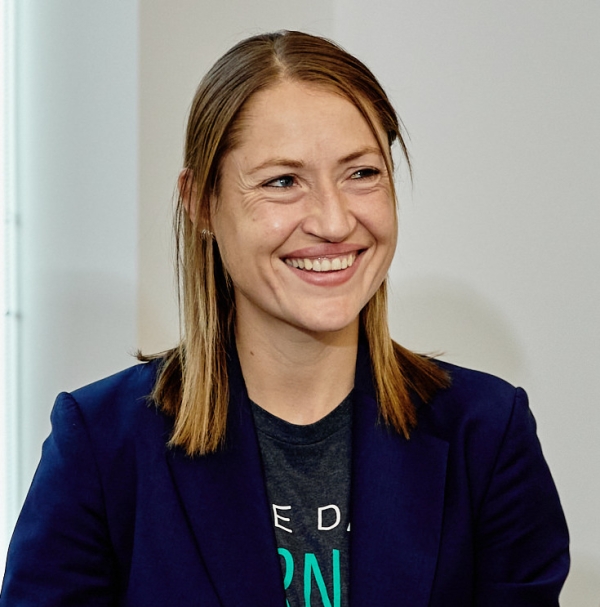You have /5 articles left.
Sign up for a free account or log in.
We got to know Sonia Howell, the organizer of Notre Dame’s Digital Learning Summit. Sonia is the director of the Office of Digital Learning, part of the larger Notre Dame Learning organization. Like many participants at the Digital Learning Summit, Sonia’s academic career has followed a nontraditional path. Sonia graciously agreed to answer our questions about her professional trajectory and her work at Notre Dame.

Q: Tell us about your role as director of the Office of Digital Learning. What are the main services that your office provides, and what initiatives are you most excited about?
A: The Office of Digital Learning (ODL) is Notre Dame’s core provider of online and digital learning experiences. As the director of the ODL, I have the privilege of leading a team of learning designers, academic media specialists and project managers who work with Notre Dame faculty to design, develop and deliver effective learning experiences. Our small (but mighty!) team works on a select number of high-priority and high-impact digital learning projects originated through strategic priorities and annual requests for proposals. Our portfolio of work includes credit-bearing initiatives, like Notre Dame’s summer online catalog and the online M.S. in data science, as well as non-credit-bearing offerings, such as our massive open online courses and other works of digitally enabled engaged scholarship. The ODL team provides course and program-level consulting, faculty training and quality assurance support to colleges, departments, programs and other academic units operating online degrees, programs or courses.
At the moment, I am really looking forward to getting started on projects accepted through our Digital Learning Sprints call for proposals. A Digital Learning Sprint is a short project that enables a faculty member, or members, to learn quickly about a tool or strategy or to explore a focused topic/area/practice in a time-limited manner. We first piloted the sprint concept in summer of 2022 with the goal of breaking down barriers to innovation in teaching and learning, providing faculty with dedicated assistance over a set period of time to enable them to experiment. Last year, we supported projects ranging from the use of 360-degree video in a digital peace studies course to a noncredit learning experience for women in leadership. This year, we have three areas of focus aligned with the ODL’s strategic priorities for 2023: equity and access, extended reality, and open educational resources. In addition to uncovering great ideas from Notre Dame faculty, the sprints provide a distinctive opportunity to collaborate with colleagues on our teaching and learning technologies team and the Kaneb Center for Teaching Excellence.
Q: Your Ph.D. in English and digital humanities is from Maynooth University in Ireland, the country you grew up in. What was your path from receiving your doctorate in Ireland to leading the Office of Digital Learning at Notre Dame?
A: It definitely wasn’t planned! As a graduate student, I was extremely fortunate to be part of a small interdisciplinary group of doctoral fellows awarded European funding for work at the intersection between humanities and technology. This pilot program gave me the opportunity to engage in interdisciplinary collaborative study with colleagues in computer science, which was one of the most formative learning experiences in my academic career. But despite the nontraditional nature of my doctoral program, I did what many humanities Ph.D. students do when they are nearing the end of their program: I applied for some highly competitive grants to convert my dissertation into a monograph. Reflecting back on that now, I was applying because I thought that the only career option I had with a Ph.D. in English was to be a professor, and to get such a position I had to write a book.
While I was awaiting responses on my applications, life brought me to South Bend, Ind., where I began working as a digital humanities research assistant for an English professor, who would become Notre Dame’s inaugural chief academic digital officer and founder of the Office of Digital Learning. I joined the ODL as a postdoctoral fellow for digital initiatives and have been with the office ever since. The first digital learning project I worked on was Notre Dame’s first MOOC, I Heart Stats, delivered on the edX platform. I learned so much working on that course—from project-managing faculty and interdisciplinary teams and working with an external platform provider to designing learning experiences for global audiences and producing creative and effective academic media. To me, it was an opportunity to engage in the type of collaboration I had enjoyed during my doctoral program to produce learning experiences that meaningfully impact on learners.
As the landscape of digital learning at Notre Dame has evolved, so, too, has my position. Over the past 10 years, I have worked on Notre Dame’s MOOCs and the university’s first fully online degree program and served as director of our summer online program. I’ve worked closely with colleges and administrative units to introduce new learning experiences to the Notre Dame ecosystem, served as the point person for the relationship with platform providers and OPMs, and developed relationships on and beyond campus that support academic innovation.
Having spent five years becoming a specialist in Irish literature and digital humanities, I now consider myself to be a generalist in the field of academic innovation. Leading an interdisciplinary team of specialists, my role as director of the ODL not only enables the work of a generalist but, I would argue, requires it.
Oh, and I never did write that monograph!
Q: What advice do you have for anyone contemplating building an academic career outside of a traditional tenure-track faculty role?
A: First, and this has been said by others in this series, do not underestimate the value of your academic training in careers other than teaching and research. You have developed skills that are deeply valuable in roles within and outside the academy. Invest time in figuring out what parts of working in academia excite you most and explore roles that will enable you to do these things daily. Look for opportunities during your Ph.D. that will give you exposure to the types of positions you may be interested in. Postdocs in offices like the ODL or centers for teaching and learning can be a fantastic way to transition from your specific discipline into alt-ac roles.
Having spent five to seven years becoming an expert in one thing, it can be daunting to enter a field where you find yourself learning new skills, processes, etc. As you think about alt-ac careers, try to keep an open mind and embrace the opportunity to further expand your repertoire of skills. For reasons beyond the scope of this interview, there can be a sense of failure when contemplating roles other than that of a professor. I assure you that choosing a position that brings you work-life balance as well as professional and personal fulfillment is not a failure!
Most importantly, find good mentors! These may come in the form of supervisors or colleagues within or outside your department. As you contemplate the alt-ac world, a good mentor will support you through the process of discernment and discovery.
Finally, I believe that much work needs to be done in the academy to normalize the idea of alt-ac careers. Only then will we see meaningful efforts made by universities, colleges and departments to prepare their graduates for whatever careers they decide to pursue post-Ph.D.




